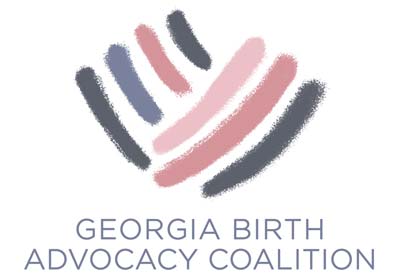Evidence-Based Pregnancy Care
Providers tell 32% of women their babies may be too big for a vaginal delivery. The average weight at birth of these babies is just 7 lbs, 12 oz. ACOG recommends C-sections only when a baby's weight may exceed 11 pounds.
Evidence-based pregnancy and childbirth care is medical care that relies on scientific evidence—not convenience, hospital policy, provider preference, tradition, or the whims of hospital lawyers and administrators. Birthing people have a right to informed, evidence-based maternity care. The overwhelming majority of people giving birth in the U.S. and in Georgia don’t receive evidence-based care. Many receive care that increases the risk of negative outcomes, long-term pain, and psychological trauma.
When birthing people don’t get evidence-based care, they are more likely to die, more likely to be unsatisfied with their births, and less likely to trust their providers.
C-Sections in Georgia: Evidence-Based Care vs. Tradition
Medically unnecessary c-sections are one example of care that is not evidence-based.
In Georgia, the biggest predictor of whether a pregnant person has a c-section is not her health, her baby’s health, or how labor progresses. It’s the hospital at which she chooses to deliver. The World Health Organization (WHO) recommends that the c-section rate not exceed 10-15%. Yet no Georgia hospital has achieved this goal. According to a 2014 AJC investigation, six Georgia hospitals—Gwinnett Medical Center, Eastside Medical Center, Northside Hospital in Forsyth, Northside Hospital in Atlanta, Wellstar Kennestone Hospital, and Emory Decatur (formerly known as Dekalb Medical Center)--have c-section rates in excess of 35%. In 2014, Northside in Atlanta had a c-section rate of 40%.
C-sections can be life-saving. Unnecessary c-sections increase the risk of complications for both mother and baby. American parents pay more to give birth than parents in almost any other part of the world. And our outcomes are consistently worse. Maternal mortality is higher in the U.S. than in any other developed nation. Georgia has the highest maternal mortality rate in the U.S. C-sections drive higher health care costs, and higher maternal mortality. C-sections also increase the risk of long-term health problems in the mother.
Georgians Deserve Evidence-Based Maternity Care
In Georgia, women pay more to get worse care. C-sections are just one example of this. Some other examples of common birth practices that are not supported by evidence and which may be dangerous include:
being denied water during labor
being forced to labor or deliver while lying flat on the back
routine administration of IV fluids absent a medical indication
augmenting labor with Pitocin without a medical reason
artificially breaking the membranes
inducing labor for suspected big baby
What Does Evidence-Based Care Look Like?
Providers who practice evidence-based medicine take a comprehensive approach, assessing all of the patient’s symptoms in context. This means also asking about lifestyle factors such as diet, exercise, family health history, any history of abuse, and living situation.
Drawing upon this evidence, doctors can assess a patient’s risk for various medical conditions. They should then use evidence-based diagnostic tools to diagnose a patient’s condition or risk factors. Thereafter, a doctor should rely on scientific research to present a patient with her treatment options. In many cases, there are multiple treatment options. The patient then chooses among these treatment options based on her doctor’s expertise and input.
Evidence-based medicine also includes giving the woman control over her own body and respecting her right to decline treatment. To learn more about the importance of bodily autonomy in childbirth, visit our Birth Options page.

